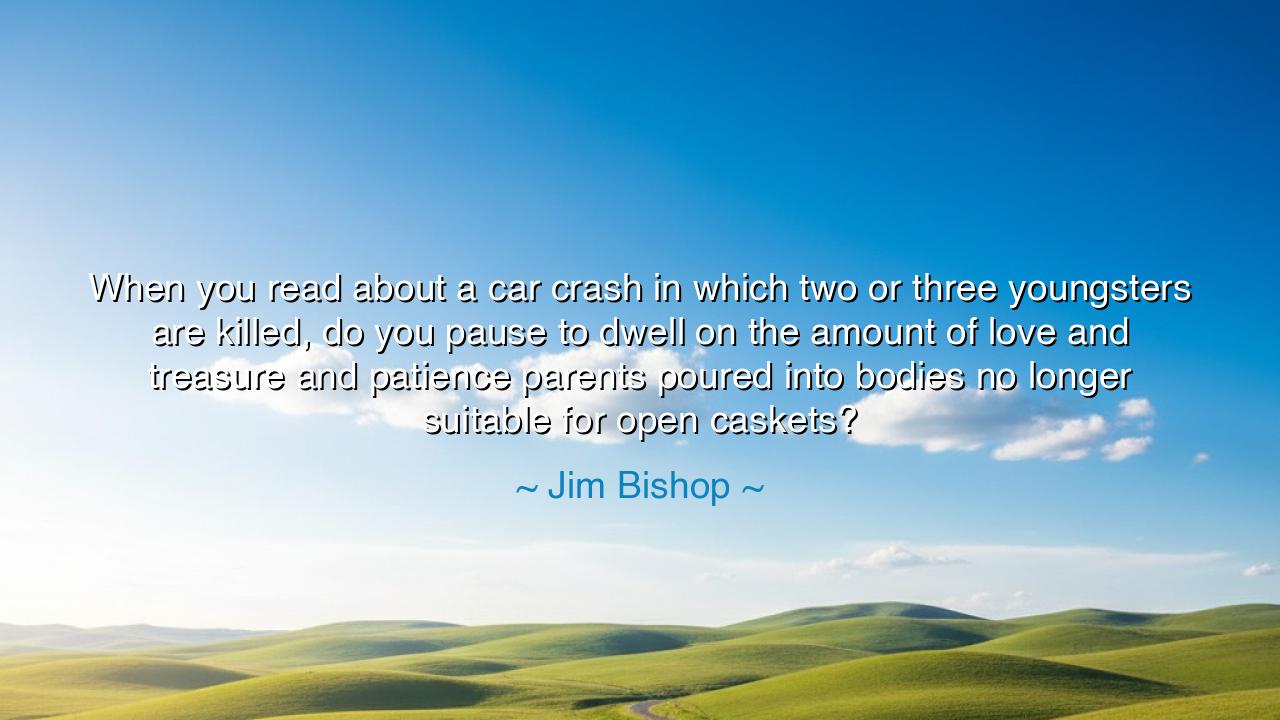
When you read about a car crash in which two or three youngsters
When you read about a car crash in which two or three youngsters are killed, do you pause to dwell on the amount of love and treasure and patience parents poured into bodies no longer suitable for open caskets?






Hear the searing words of Jim Bishop, journalist and observer of the human condition, who asked with piercing clarity: “When you read about a car crash in which two or three youngsters are killed, do you pause to dwell on the amount of love and treasure and patience parents poured into bodies no longer suitable for open caskets?” These words strike like thunder upon the heart. They are not meant to comfort but to awaken, to shatter the indifference with which we so often consume tragedy as news. Bishop demands that we see not only the wreckage of the moment, but the years of unseen devotion that lie buried with those young lives.
The origin of this saying lies in Bishop’s reflections on the ordinary but sacred bonds of family. As a chronicler of life and death, he saw how newspapers reduce human suffering into statistics and brief reports. Yet behind every brief headline lies a universe of sacrifice: nights of wakefulness, years of nurturing, the immeasurable patience of parents who gave their strength and tenderness to raise a child. When such a life is cut short, it is not only a person who perishes, but the silent labor of love that shaped them, now torn from the world with cruel suddenness.
Consider the imagery of his words: the open casket, once a place for final farewell, denied because the body is too broken. Yet Bishop calls us not to look away, but to remember what those broken bodies once contained—the joy of a first step, the laughter of youth, the long years of treasure invested in raising them. He reminds us that love poured into a child is not measured in days, but in lifetimes. To lose such a being is to lose not only the future but also the past that shaped them.
History itself bears witness to this truth. Think of the great wars of the twentieth century, when telegrams delivered news of sons fallen in distant fields. Behind every letter was a home where parents had labored, sacrificed, and dreamed for that life. Abraham Lincoln himself, in his letter to Mrs. Bixby—mother of five sons said to have died in battle—spoke of the “solemn pride” and the immeasurable grief of such a loss. Bishop’s words echo this ancient grief: we must not see the death of youth as a number, but as the silencing of years of care.
The heart of Bishop’s saying is to rebuke the cold detachment with which society often views suffering. We glance at headlines, we sigh, and we move on. But if we paused—if we truly dwelled on the enormity of parental love poured into each child—we would treat life itself with greater reverence. We would drive with more care, live with more gentleness, and honor the hidden sacrifices that bring each life to maturity. For no life is an accident of the moment; each is the fruit of countless acts of devotion.
The lesson, then, is both simple and profound: respect the fragility of life, and never take for granted the hidden labors of love that sustain it. Every young person you meet is not just an individual but the living vessel of a parent’s patience, a community’s support, and a thousand small sacrifices. When a life ends suddenly, pause to honor what was lost—not only the person, but also the devotion that shaped them. In this remembrance lies the seed of compassion.
So I say to you, children of tomorrow: do not let tragedy pass you by as mere newsprint. Let it touch you, let it humble you. Live carefully, that your actions may not bring needless sorrow. Honor your parents, for their love sustains you daily. And when you hear of lives cut short, dwell upon the treasure of love that was poured into them, and let that thought make you gentler, more vigilant, more grateful. For Bishop speaks the truth: behind every broken body is a story of devotion, and to remember it is to keep alive the sacred weight of love.






AAdministratorAdministrator
Welcome, honored guests. Please leave a comment, we will respond soon